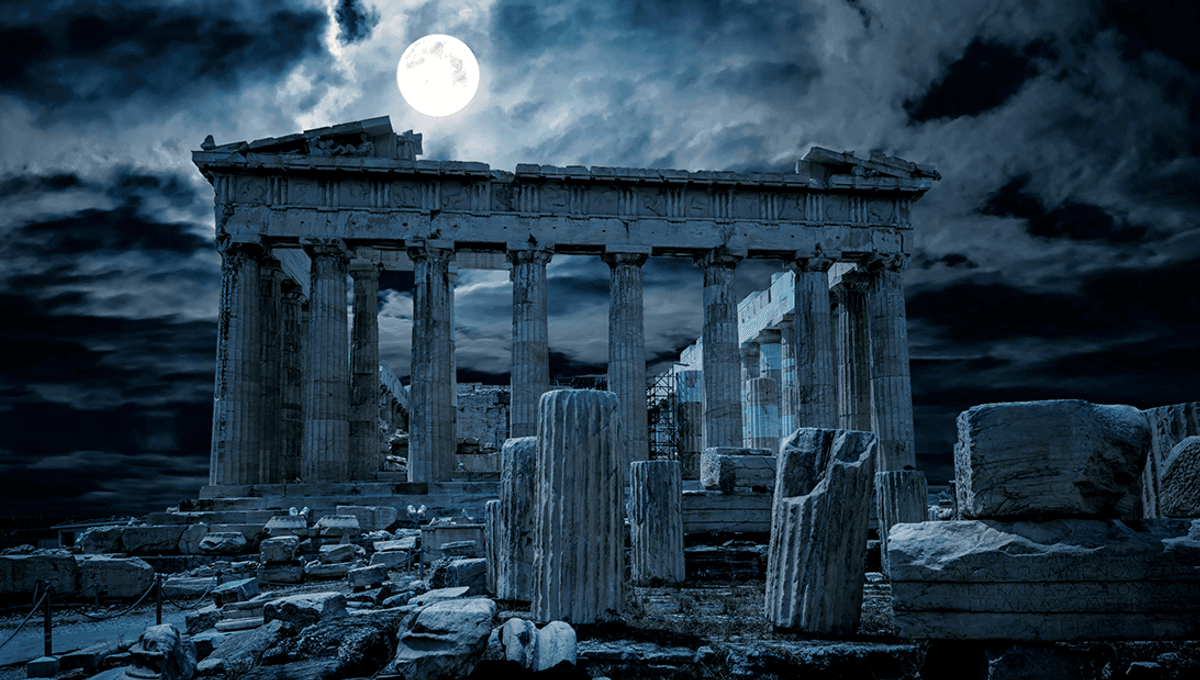
In more recent times, our visions of the end of the world have ranged from the quite drastic threat of the climate crisis and nuclear war to imagining artificial intelligence absorbing and replacing us.
Before that, there were biblical tales of angels pouring their bowels upon the Earth, turning the seas to blood, and the Norse Ragnarök. But before that, what did the Ancient Greeks think about the end of the world?
For a lot of Ancient Greeks, including philosophers Plato and Aristotle, the world didn’t end but was cyclical, with Plato believing that survivors would always rebuild after a catastrophe. Many of the Stoics believed in Ekpyrosis, the periodic destruction of the cosmos – every 36,000 years, according to Plato – before a new cycle begins again.
Rather than focusing on an end to humanity and the world, Greek mythology and philosophy spoke more of the gods and catastrophes of the past. Nevertheless, there are some accounts of apocalypses past and future in ancient writings.
Greek poet, economic philosopher, contemporary of Homer, and occasional chronicler of history, Hesiod, did write of a sort of apocalypse taking place, where the gods destroy humanity.
The Five Ages of Man according to greek mythology
In Hesiod’s epic poem Works and Days (700 BCE) he separated the five periods of human history into different ages. The five periods – The Golden, Silver, Bronze, Heroic, and Iron Ages – describe the progression of humankind through the lens of Greek mythology.
First was the Golden Age, just after the “deathless gods who dwell on Olympus made a golden race of mortal men”. Then came a “second generation which was of silver and less noble by far”. Then came the Bronze Age, a third generation that was “terrible and strong”, and keen on violence.
“These were destroyed by their own hands and passed to the dank house of chill Hades, and left no name,” he wrote. “Terrible though they were, black Death seized them, and they left the bright light of the sun.”
In some versions of the tale, Zeus sends a flood to kill the Bronze Age humans.
After that, Zeus made a “god-like race of hero-men”, when most Greek mythological heroes including Perseus, Odysseus, and Achilles supposedly lived. Hesiod lamented that he hadn’t been born in the age of heroes, but in the next age.
“For now truly is a race of iron, and men never rest from labor and sorrow by day, and from perishing by night; and the gods shall lay sore trouble upon them.”
Hesiod believed this “bitter” and “hard-hearted” age would be the last.
“But, notwithstanding, even these shall have some good mingled with their evils. And Zeus will destroy this race of mortal men also when they come to have grey hair on the temples at their birth.”
Hesiod goes into more detail about this age, seeing it as a time when evil-doers get praise for their violent deeds, and humanity delights in evil.
“And then Aidos and Nemesis, with their sweet forms wrapped in white robes, will go from the wide-pathed earth and forsake mankind to join the company of the deathless gods: and bitter sorrows will be left for mortal men, and there will be no help against evil.”
We better hope the world is cyclical because that does not sound like a good way to end.
Source Link: How Ancient Greek Philosophers And Mythology Saw The End Of The World